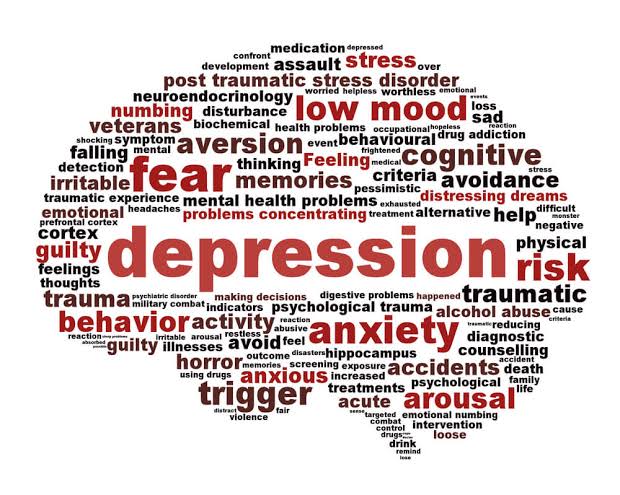
Depression, also known as major depressive disorder, is a common mental health condition that casts a shadow over millions of lives worldwide. It is characterized by persistent feelings of sadness, hopelessness, and a loss of interest or pleasure in daily activities. Unlike regular mood fluctuations, depression is intense, chronic, and not proportional to a person's circumstances.
Globally, approximately 5% of adults suffer from depression, with women being more affected than men. Depression can lead to suicidal thoughts, making it a serious concern. Effective treatments exist for mild, moderate, and severe depression, but unfortunately, around 39% of adults with major depressive episodes do not receive treatment.
.jpeg)
During a depressive episode, individuals experience a persistent sad mood, often accompanied by a loss of interest or pleasure in previously enjoyed activities. Poor concentration, excessive guilt, low self-worth, and feelings of hopelessness further characterize depression. Disrupted sleep, changes in appetite or weight, and fatigue contribute to the overall burden.
Depression significantly impacts various aspects of life, including relationships, work, and overall well-being.
Common signs of depression
The common signs of depression include the following;
1. Persistent Low Mood
Feeling down occasionally is normal, but when this mood persists, it may indicate depression. Individuals with depression often describe feeling continually out of sorts. Anxiety symptoms may accompany depression, along with a sense of impending doom. Some may even feel emotionally “flatlined” unable to respond to positive or negative events.
2. Loss of Interest or Pleasure
"What's the point?" and "Why bother?" become common refrains during depression. Activities that once brought joy whether work, hobbies, or social interactions lose their appeal. Energy wanes, and the desire to engage in previously enjoyed pursuits diminishes.
3. Feelings of Guilt, Hopelessness, and Worthlessness
Depression often brings overwhelming guilt about past actions or events. Individuals may loathe themselves and experience low self-esteem. Hopelessness sets in, convincing them that there's no path to feeling better.
4. Loss of Sex Drive
Depression can significantly impact sexual desire. A waning sex drive can lead to feelings of guilt, especially when partners struggle to understand the sudden change. Recognizing this sign is essential for addressing both emotional and physical aspects of depression.
Remember, depression is more than fleeting sadness—it affects every facet of life.
What are the causes of depression
1. Genetic and Biological Factors
Genetics: A person's genetic makeup significantly influences their vulnerability to depression. If close family members have experienced depression, the risk increases. Certain genetic variations may impact neurotransmitter function, affecting mood regulation.
Brain Chemistry: Neurotransmitters—such as serotonin, dopamine, and norepinephrine—play a pivotal role in mood regulation. Imbalances in these chemicals can contribute to the development of depression. Brain regions involved in emotional processing also come into play.
2. Environmental and Life Events
Trauma: Experiencing abuse, severe losses, or other distressing events can trigger depression. Trauma disrupts neural circuits and alters stress responses, leading to persistent mood changes.
Chronic Stress: Prolonged stress overwhelms coping mechanisms, affecting the brain's structure and function. Stress hormones impact neurotransmitter balance, potentially leading to depressive symptoms.
Social Isolation: Lack of social support exacerbates vulnerability to depression. Human connection and social engagement are essential for mental well-being.
3. Medical Conditions and Hormonal Changes
Chronic Illness: Conditions like diabetes, heart disease, or chronic pain can contribute to depression. The burden of managing a chronic illness takes a toll on mental health.
Hormonal Fluctuations: Hormonal changes during pregnancy, postpartum, or menopause can affect mood. The delicate interplay between hormones and neurotransmitters influences emotional states.
Neurological Disorders: Conditions like Parkinson's disease or Alzheimer's may lead to depression. Brain changes associated with these disorders impact mood regulation.
4. Psychological Factors
Negative Thought Patterns: Prolonged negative thinking patterns, such as rumination and self-criticism, influence mood. Cognitive distortions perpetuate depressive symptoms.
Personality Traits: Certain personality traits correlate with depression. For example, perfectionism, pessimism, and high neuroticism increase susceptibility.
Coping Mechanisms: Maladaptive coping strategies, such as avoidance or substance use, contribute to the persistence of depressive episodes.
.jpeg)
Effects of depression
Depression's effects cast a long shadow, impacting not just mood but rippling outward to touch every aspect of a person's life. Here's a detailed breakdown of how depression can manifest:
Emotional Effects:
• Low Mood and Sadness: This is a core symptom, a persistent feeling of emptiness, despondency, or unhappiness that lingers most of the day.
• Loss of Pleasure: Activities that were once enjoyable become a chore, or hold no appeal. Hobbies, socializing, even favorite foods can lose their spark.
• Anxiety and Irritability: Depression often brings heightened anxiety, a feeling of being on edge or constantly worried. Frustration and impatience can also rise, leading to outbursts or arguments.
• Hopelessness and Pessimism: A pervasive sense of despair can take root, with a belief that things will never improve and no point exists in trying.
• Guilt and Worthlessness: Self-criticism intensifies, leading to feelings of worthlessness and constant blame, even for minor setbacks.
Physical Effects:
• Changes in Sleep: Sleep can become disrupted, with difficulty falling asleep, waking up frequently, or sleeping excessively.
• Fatigue and Low Energy: A lack of motivation and zest for life translates to constant tiredness, a feeling of being drained even after minimal exertion.
• Changes in Appetite: Loss of appetite or overeating can occur, leading to unintended weight loss or gain.
• Body Aches and Pains: Unexplained aches, pains, headaches, or digestive problems may plague someone with depression, even with no underlying physical cause.
Cognitive Effects:
• Difficulty Concentrating: Focusing on tasks becomes a struggle, thoughts feel jumbled, and forgetfulness increases.
• Indecisiveness: Making decisions, even small ones, can feel overwhelming, leading to procrastination and a sense of being stuck.
• Slowed Thinking: Processing information slows down, and tasks that were once easy take longer to complete.
Behavioral Effects:
• Social Withdrawal: The pull to isolate oneself from friends, family, and social activities strengthens. Engaging with others feels draining, and social anxiety can worsen.
• Neglect of Personal Care: Basic routines of showering, getting dressed, or maintaining hygiene can fall by the wayside.
• Increased Risk-Taking Behavior: Self-destructive tendencies can emerge, with increased use of alcohol, drugs, or engaging in risky activities.
Suicidal Ideation:
In severe cases, depression can lead to thoughts of death or suicide. It's crucial to take these thoughts seriously and seek immediate help
How to deal with depression?
Dealing with depression can be challenging, but there are steps you can take to improve your well-being. Here are the steps:
1. Seek Support: It's crucial to talk to someone about what you're experiencing. Whether it's a friend, family member, or therapist, having someone who listens without judgment can provide relief and help you feel less alone. Therapists are trained to offer support and tools for managing depression effectively.
2. Therapy: Therapy provides a structured environment to explore your thoughts, feelings, and behaviors. CBT, for example, helps you identify negative thought patterns and replace them with more balanced and realistic ones. Other forms of therapy, like interpersonal therapy or psychodynamic therapy, focus on different aspects of your life and relationships.
3. Medication: If recommended by a healthcare professional, medication can be a valuable tool in managing depression. Antidepressants work by balancing neurotransmitters in the brain, helping to alleviate symptoms. It's essential to work closely with a doctor to find the right medication and dosage for you.
4. Stay Active: Regular physical activity is not only good for your physical health but also your mental health. Exercise releases endorphins, which are chemicals in the brain that act as natural painkillers and mood elevators. Find activities you enjoy, whether it's walking, jogging, dancing, or yoga, and aim for at least 30 minutes most days of the week.
5. Self-Care: Taking care of yourself is essential when dealing with depression. This includes getting enough sleep, eating nutritious foods, and avoiding substances like alcohol and drugs, which can worsen depression symptoms. Make time for activities that bring you joy and relaxation, whether it's reading, spending time in nature, or practicing a hobby.
6. Set Goals: Setting achievable goals, no matter how small, can provide a sense of purpose and accomplishment. Start with simple tasks and gradually increase their difficulty as you feel more capable. Celebrate your successes along the way, and don't be too hard on yourself if you experience setbacks.
7. Mindfulness and Relaxation: Mindfulness practices, such as meditation and deep breathing exercises, can help calm your mind and reduce stress. Incorporating these techniques into your daily routine can improve your overall well-being and resilience to depression triggers.
8. Routine: Establishing a daily routine can add stability to your life, which is especially beneficial when coping with depression. Set regular sleep and wake times, schedule meals and activities, and prioritize self-care. Having a predictable schedule can reduce feelings of chaos and overwhelm.
9. Limit Negative Influences: Pay attention to how certain people, situations, or media affect your mood and well-being. Limit exposure to negative influences, such as toxic relationships, social media comparisons, or distressing news. Surround yourself with positive influences and sources of support whenever possible.
10. Be Patient and Kind to Yourself: Recovery from depression is a journey that takes time and effort. Be patient with yourself and acknowledge the progress you've made, no matter how small. Practice self-compassion and treat yourself with the same kindness and understanding you would offer to a friend in a similar situation. Remember that asking for help is a sign of strength, not weakness.
Recognizing the signs, seeking professional help, and fostering social connections are crucial steps. Remember, you’re not alone in this silent struggle. Healing is possible, and hope awaits those who reach out.












